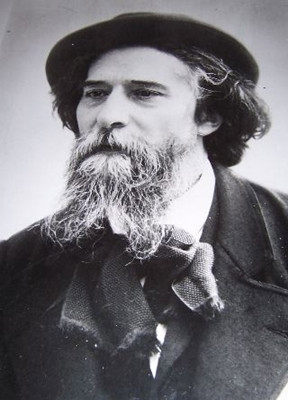And then you see what happens.
現(xiàn)在,你知道出了什么事…
Ah! it has been the great misfortune of our Alsace always to postpone its lessons until to-morrow.
唉!我們阿爾薩斯人的最大不幸就是把教育拖延到明天。
Now those people are entitled to say to us:
現(xiàn)在,那些人有權利對我們說:
What! you claim to be French, and you can neither speak nor write your language!
怎么!你們聲稱自己是法國人,可你們即不會說也不會寫你們的語言!
In all this, my poor Frantz, you are not the guiltiest one. We all have our fair share of reproaches to address to ourselves.
我可憐的弗朗茨,造成所有這一切,責任最大的并不是你。我們每個人都有許多應該責備自己的地方。
Your parents have not been careful enough to see that you were educated.
你們的父母沒有盡心讓你們好好讀書。
They preferred to send you to work in the fields or in the factories, in order to have a few more sous.
他們寧愿把你們打發(fā)到田里或紗廠里去干活,為的是多掙幾個錢。
And have I nothing to reproach myself for?
我自己呢,難道我一點也沒有應該責備自己的地方嗎?
Have I not often made you water my garden instead of studying?
我不也是經(jīng)常讓你們到我的花園澆水以此代替學習嗎?
And when I wanted to go fishing for trout, have I ever hesitated to dismiss you?
當我想釣鱒魚的時候,我不是隨隨便便就給你們放假嗎?
Then, passing from one thing to another, Monsieur Hamel began to talk to us about the French language, saying that it was the most beautiful language in the world, the most clear, the most substantial;
阿麥爾先生從一件事談到另一件事,然后開始給我們講法語,他說,法語是世界上最優(yōu)美的語言,是最清晰的語言,最嚴謹?shù)恼Z言,
that we must always retain it among ourselves, and never forget it, because when a people falls into servitude,
我們應該掌握它,永遠也不要忘記,因為,當一個民族淪為奴隸時,
so long as it clings to its language, it is as if it held the key to its prison.
只要它好好地保存自己的語言,就好像掌握了打開監(jiān)牢的鑰匙…
Then he took the grammer and read us our lesson.
然后,他拿了一本語法書,我們開始朗誦課文。
I was amazed to see how readily I understood.
令我吃驚的是,我竟理解得這么透徹。

Everything that he said seemed so easy to me, so easy.
他所講的一切對我都顯得很容易,很容易。
I believed, too, that I had never listened so closely, and that he, for his part, had never been so patient with his explanations.
我同樣覺得,我還從來沒有這么認真聽講過,他也從來沒有這樣耐心講解過。
One would have said that, before going away, the poor man desired to give us all his knowledge, to force it all into our heads at a single blow.
這個可憐的人,仿佛想在離開這里以前,把他全部的知識都灌輸給我們,讓我們一下子掌握這些知識。
When the lesson was at an end, we passed to writing.
課文講解完了,我們開始練習寫字。
For that day Monsieur Hamel had prepared some entirely new examples, on which was written in a fine, round hand:
這一天,阿麥爾先生為我們準備了許多嶄新的字卡樣,上面用美麗的圓體字寫著:
France, Alsace, France, Alsace.
法蘭西,阿爾薩斯,法蘭西,阿爾薩斯。
They were like little flags, waving all about the class, hanging from the rods of our desks.
這些字帖卡片懸掛在我們課桌的金屬桿上,就像許多小旗在教室里飄揚。
You should have seen how hard we all worked and how silent it was!
該知道每個人都是那樣聚精會神,教室里是那樣寂靜無聲!
Nothing could be heard save the grinding of the pens over the paper.
只聽得見筆尖在紙上的沙沙聲。
At one time some cock-chafers flew in;
有一回,幾只金龜子跑進了教室,
but no one paid any attention to them, not even the little fellows who were struggling with their straight lines, with a will and conscientious application, as if even the lines were French.
但是誰也不去注意它們,連年齡最小的也不例外,他們正專心致志地練直杠筆劃,仿佛這些筆劃也是法語…
On the roof of the schoolhouse, pigeons cooed in low tones, and I said to myself as I listened to them:
學校的屋頂上,鴿子低聲地咕咕地叫著,我一邊聽,一邊尋思:
I wonder if they are going to compel them to sing in German too!
他們該不會強迫這些鴿子用德語唱歌吧?
From time to time, when I raised my eyes from my paper.
我時不時地從書本上抬起眼睛,
I saw Monsieur Hamel sitting motionless in his chair and staring at the objects about him as if he wished to carry away in his glance the whole of his little schoolhouse.
看見阿麥爾先生一動不動地坐在椅子上,注視著周圍的一切東西,仿佛要把這個小小教室里的一切都裝進目光里帶走…
Think of it! For forty years he had been there in the same place, with his yard in front of him and his class just as it was!
可想而知!四十年來,他一直呆在這個地方,守著對面的院子和一直沒有變樣的教室。
But the benches and desks were polished and rubbed by use;
唯獨教室里的凳子、課桌被學生磨光滑了;
the walnuts in the yard had grown, and the hop-vine which he himself had planted now festooned the windows even to the roof.
院子里的胡桃樹長高了,他自己親手種下的那棵啤酒花如今爬滿了窗戶,爬上了屋頂。
What a heart-rending thing it must have been for that poor man to leave all those things, and to hear his sister walking back and forth in the room overhead, packing their trunks!
這個可憐的人聽到他妹妹在樓上的臥室里來來回回地收拾行李,想到自己就要告別眼前的一切,這對他來說是多么傷心難過的事啊!
For they were to go away the next day—to leave the province forever.
因為,他們明天就要動身了,永遠離開自己的家鄉(xiāng)。
However, he had the courage to keep the class to the end.
他竟然還有勇氣把我們的課上完。
After the writing, we had the lesson in history;
習字過后,我們上了歷史課;
then the little ones sang all together the ba, be, bi, bo, bu.
接著小家伙們一起唱起了Ba Be Bi Bo Bu。
Yonder, at the back of the room, old Hauser had put on his spectacles, and, holding his spelling-book in both hands, he spelled out the letters with them.
教室后頭,奧澤爾老人戴上了眼鏡,兩手捧著識字課本,跟我們一起拼讀。
I could see that he too was applying himself.
我發(fā)現(xiàn)他也一樣專心,
His voice shook with emotion, and it was so funny to hear him, that we all longed to laugh and to cry.
他的聲音由于激動而顫抖,聽起來很滑稽,叫我們又想笑又想哭。
Ah! I shall remember that last class.
噢!我將永遠也不會忘記這最后的一課…
Suddenly the church clock struck twelve, then the Angelus rang.
突然,教堂的鐘聲敲了十二下,而后是祈禱的鐘聲。
At the same moment, the bugles of the Prussians returning from drill blared under our windows.
與此同時,普魯士士兵的操練完回營的號聲在我們的窗戶下回響…
Monsieur Hamel rose, pale as death, from his chair. Never had he seemed to me so tall.
阿麥爾先生從椅子上站了起來,面色十分蒼白。他在我的心目中,從來也沒有顯得這么高大。
My friends, he said, my friends, I—I—
我的朋友們,他說道,我的朋友們,我…我…
But something suffocated him. He could not finish the sentence.
但是,有什么東西堵住了他的喉嚨。
Thereupon he turned to the blackboard, took a piece of chalk, and, bearing on with all his might, he wrote in the largest letters he could:
他沒能說完這句話。這時,他轉過身子,拿起一截粉筆,使盡了全身力氣,在黑板上盡可能大地寫下幾個字:
VIVE LA FRANCE!
法蘭西萬歲!
Then he stood there, with his head resting against the wall, and without speaking, he motioned to us with his hand:
然后,他呆在那里,頭靠著墻壁,一句話也不說,只是用手向我們示意:
That is all; go.
課完了…你們走吧。











